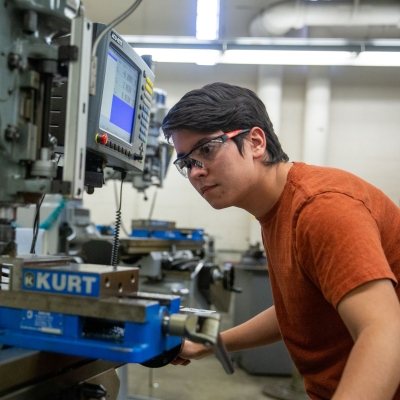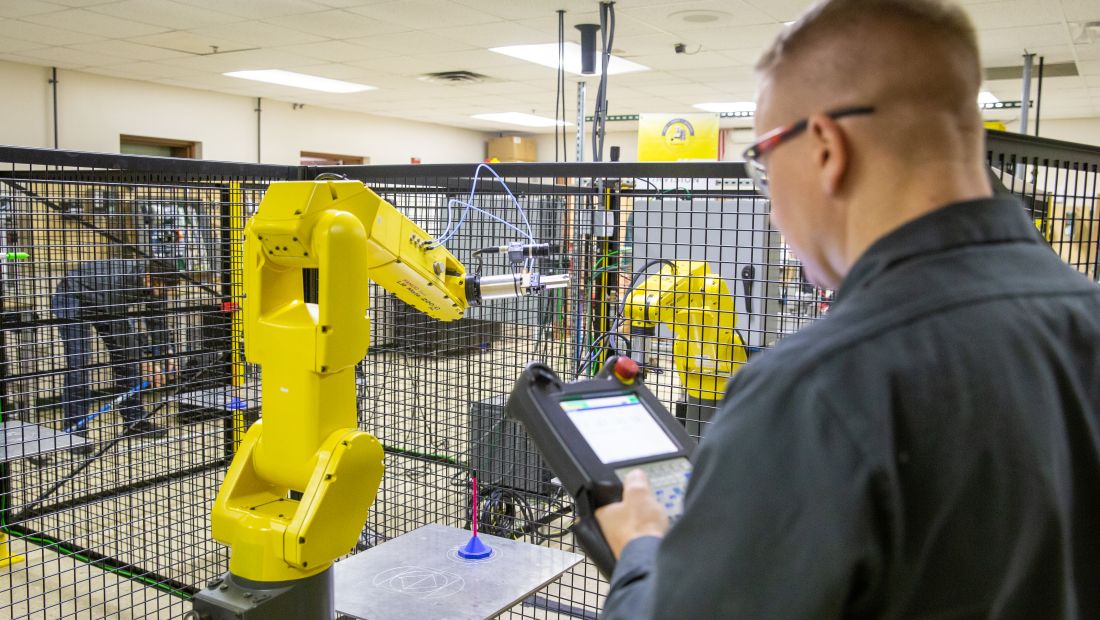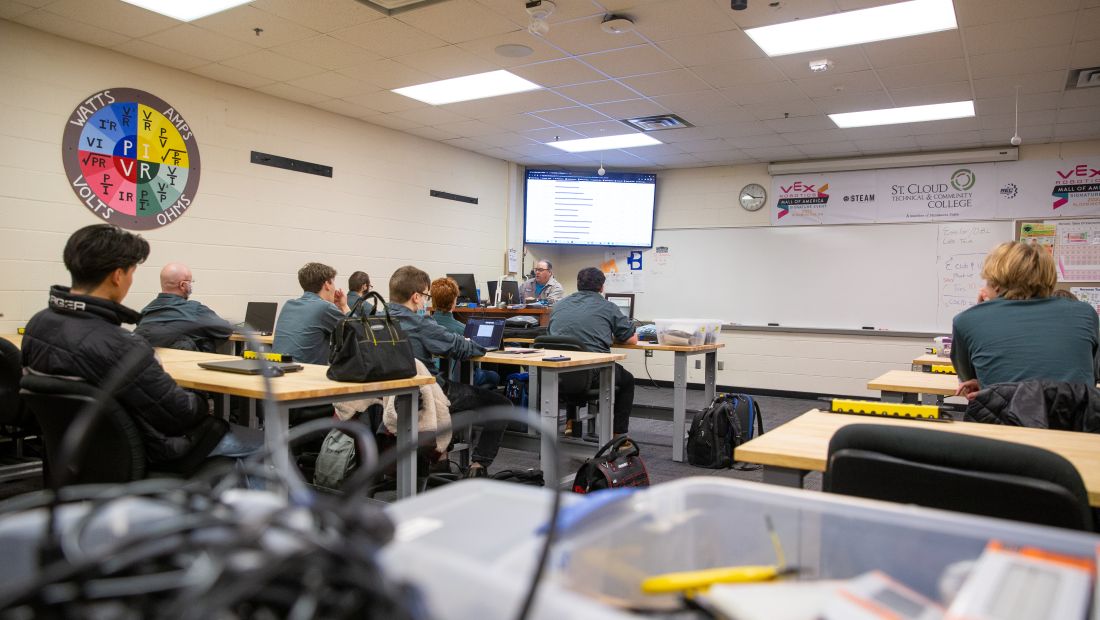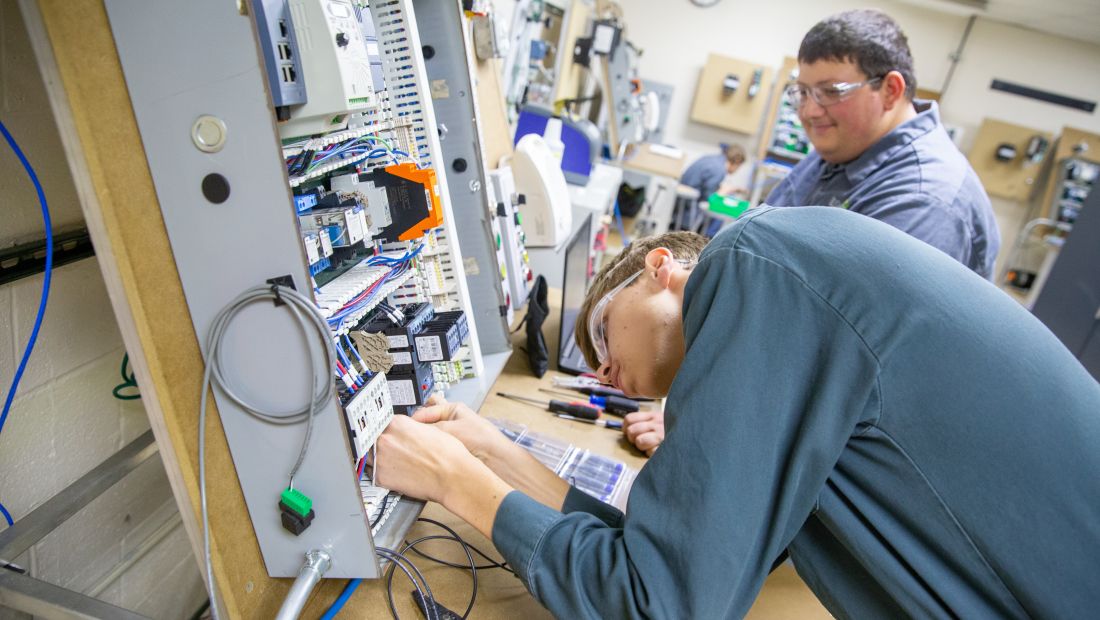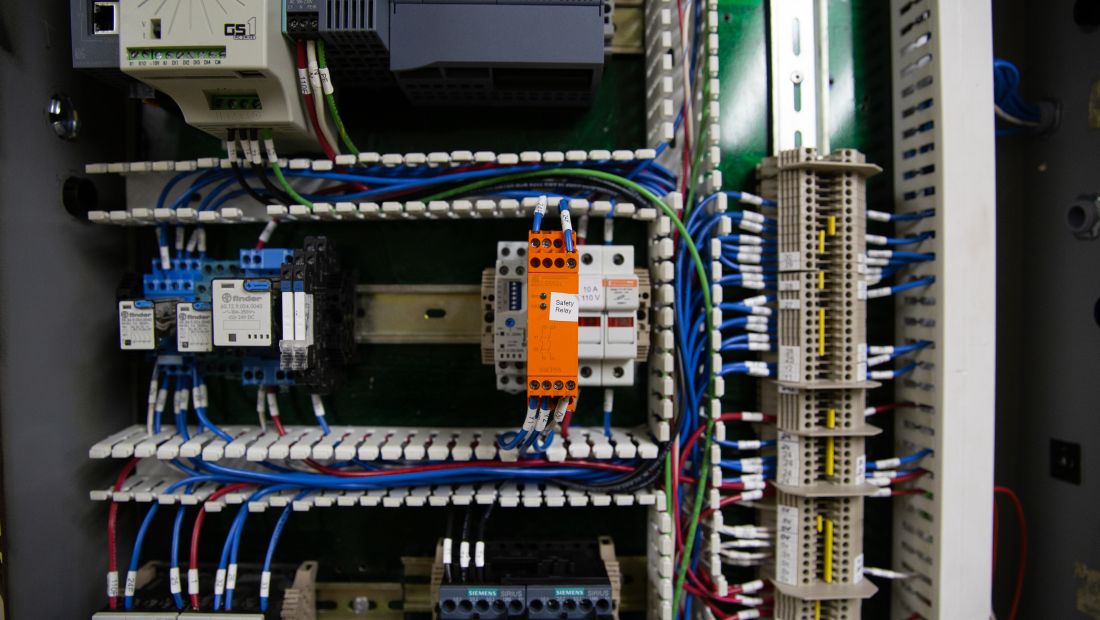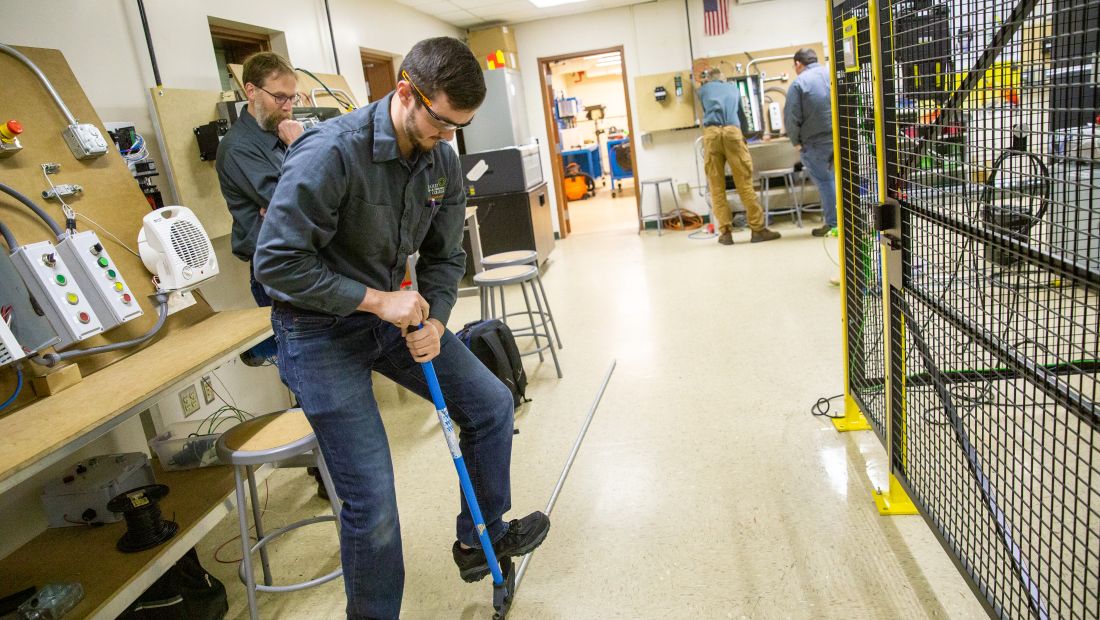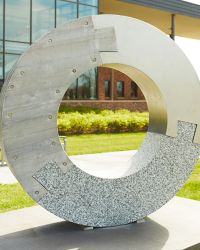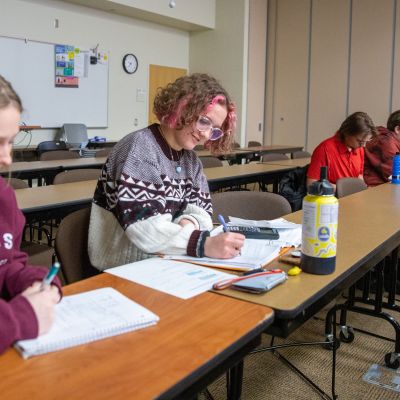DEGREES IN Robotics & Industrial Controls
Instrumentation & Process Control Associate of Applied Science
By the Numbers
Mechatronics Associate of Applied Science
By the Numbers
Mechatronics Certificate
By the Numbers
Why Choose This Program
Many of our students choose to major with more than one degree to make them more versatile in the workforce. Students interested in Robotics & Industrial Controls can choose to major in instrumentation & process control or mechatronics & automation.
In our Instrumentation & Process Control program, students will learn electronic engineering principles and technical skills in the fields of instrumentation measurement, industrial control systems, automated systems, process control, plant equipment maintenance, embedded microcontrollers, and data acquisition systems.
Students who specialize in Mechatronics & Automation will be able to use their electronic engineering and technical skills in the fields of instrumentation and industrial control systems, digital and analog circuits, automated manufacturing and robotics, manufacturing and facilities maintenance, embedded microcontroller, and telecommunications systems. Students can even solve engineering problems and design robotic and automated systems.
Placement rate from self-reported data of graduates available for work in field of study up to one year post graduation. Wage data is from Minnesota Dept. of Employment and Economic Development (DEED). SCTCC Consumer Information.
From Degree to Career
When you choose the Robotics & Industrial Controls program at SCTCC, you’ll gain skills that will directly transfer to the workplace. Employers of past Robotics & Industrial Controls graduates include Park Industries, All Energy Solar, Xcel Energy, and Central McGowan, to name a few.
Each specialized program at SCTCC equips students with different skills needed to succeed in their career focus area. We not only prepare students for further education, but for the workforce as well.
Every student, no matter the program is equipped with the skills to demonstrate safe and appropriate use of test equipment.
Instrumentation and Process Control
Students in the SCTCC instrumentation and process control program learn to maintain and repair electro-mechanical devices, equipment, and systems, construct, test, and repair basic digital and analog electronic circuits, and have the ability to troubleshoot and maintain an open and closed loop process while comfortably using precision calibration equipment.
After graduation, students can demonstrate effective and efficient use of available resources and computer literacy through the use of word-processing, spreadsheet, database, and simulation software.
Mechatronics & Automation
The ability to maintain and repair electro-mechanical devices, equipment, and systems, demonstrate effective and efficient use of available resources, and construct, test, and repair basic digital and analog electronic circuits are all skills taught to mechatronics majors at SCTCC.
Students can also demonstrate computer literacy through the use of word-processing, spreadsheet, database, and simulation software and can perform predictive maintenance procedures and translate results into valid information to accurately predict failures that could occur in the future.
Quick Glance
Instrumentation & Process Control
- Maintain and repair electro-mechanical devices, equipment, and systems
- Demonstrate effective and efficient use of available resources
- Demonstrate computer literacy through the use of word-processing, spreadsheet, database, and simulation software.
- Construct, test, and repair basic digital and analog electronic circuits.
- Demonstrate safe and appropriate use of test equipment.
- Ability to troubleshoot and maintain an open and closed loop process while comfortably using precision calibration equipment.
Mechatronics
- Maintain and repair electro-mechanical devices, equipment, and systems
- Demonstrate effective and efficient use of available resources
- Demonstrate computer literacy through the use of word-processing, spreadsheet, database, and simulation software.
- Construct, test, and repair basic digital and analog electronic circuits.
- Demonstrate safe and appropriate use of test equipment.
- Perform predictive maintenance procedures and translate results into valid useful information to accurately predict failures that could occur in the future.
View all program learner outcomes
SCTCC equips every student with the skills needed to succeed in the workforce. Graduates from our energy and electronics programs have career opportunities working as power plant operators, electrical and electronic engineer technicians, nuclear technicians, and electronic equipment repair.
Our graduates have even worked as industrial electronics technicians, medical device testing and calibration workers, and automation technicians. Students have also utilized their skills to work in areas of power generation, robotics, and telecommunications.
Quick Glance
- Power Plant operator
- Electrical and Electronic Engineer Technician
- Nuclear Technician
- Industrial Electronics Technician
- Electronic Equipment Repair
- Medical device testing and calibration
- Power generation
- Robotics
- Automation technician
- Telecommunications
Robotics & Industrial Controls graduates have gone one to work with well-respected companies like Park Industries, All Energy Solar, and Xcel Energy. By utilizing the skills taught in SCTCC classrooms, students are guaranteed to find a job for them.
Our students have even worked with companies such as the Department of Veterans Affairs, Minnesota Electronica, Productivity Inc., Whirltronics, and Universal Hospital Services.
Quick Glance
- Park Industries
- All Energy Solar
- Department of Veterans Affairs
- Minnesota Electronica
- Xcel Energy
- Productivity Inc.
- Whirltronics
- Universal Hospital Services
Robotics & Industrial Controls instructor Aaron Barker is a FANUC Certified CERT Instructor.
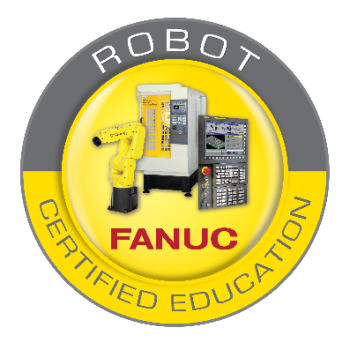
FANUC instructors provide comprehensive technical CNC, robotics and ROBODRILL training, with interactive courses.
SCTCC has an articulation agreement with Dunwoody College of Technology. This agreement allows students to transfer their credits to continue their education at Dunwoody in either Industrial Engineering Technology, B.S. or Automation & Controls Engineering Technology, B.S.
- Review articulation agreements
- Review Transfer guides for more details
Ready to Take the Next Step?
Are you ready to learn more about the Robotics & Industrial Controls program and being a student at SCTCC?

Fill out this form to receive useful information that's specific to your program.
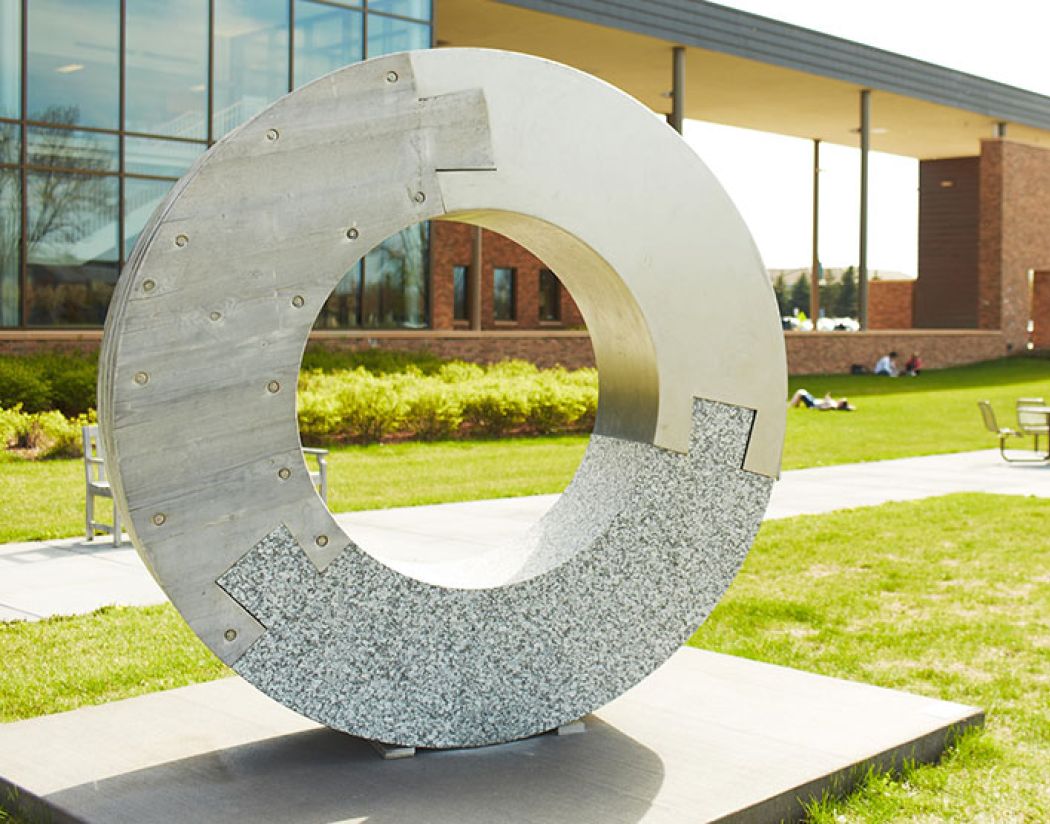
- Call us at 320-308-5089
-
Email us at recruitment@sctcc.edu
- On campus Monday-Friday, 8 a.m.-4:30 p.m.
Visiting campus is an excellent opportunity to learn about SCTCC programs, the application process, and tour the state-of-the-art-labs and classrooms.
Paying for College
Students choose SCTCC for a lot of reasons, but saving money is one reason we hear from almost every student at SCTCC. We’ve got a breakdown of the costs for the program, along with information on financial aid and scholarships.
This program requires laptops. Find information on required specifications
Apply just once and you are considered for all eligible SCTCC scholarships!


Program Info for Current Students
The Robotics & Industrial Controls program has some degrees that require Windows laptops:
- Mechatronics
- Instrumentation and Process Control
Find information on required laptop specifications for the program.
VEX Robotics Competition
VEX Robotics is a way for students to explore STEM learning through creating robots, solving problems, and competing at local, state, and national levels. SCTCC is proud to support VEX Robotics and welcomes students into its Robotics & Industrial Controls program who are excited about entering the field of robotics.
Robotics & Industrial Controls Department
Good Stuff
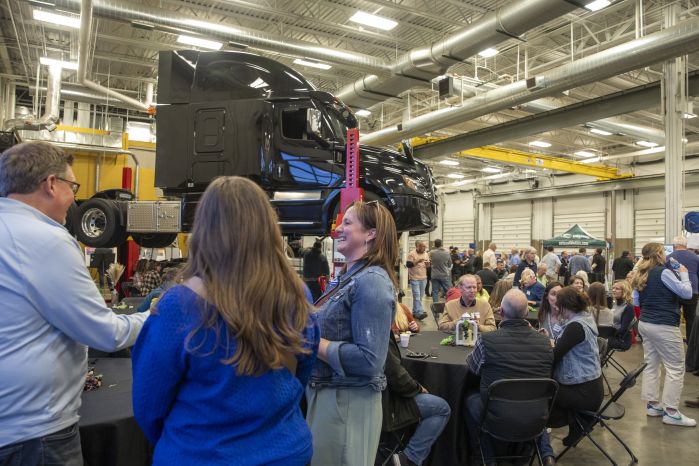
Craft Brews, Culinary Creations, and Competitive Robots
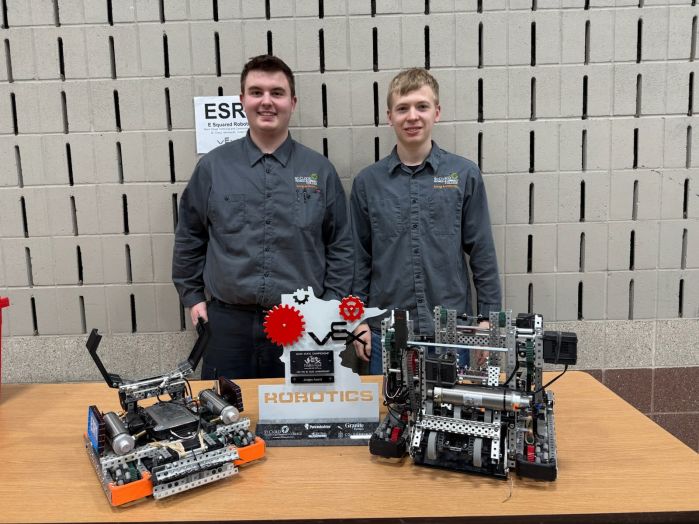
SCTCC's VEX U Team Snags Award
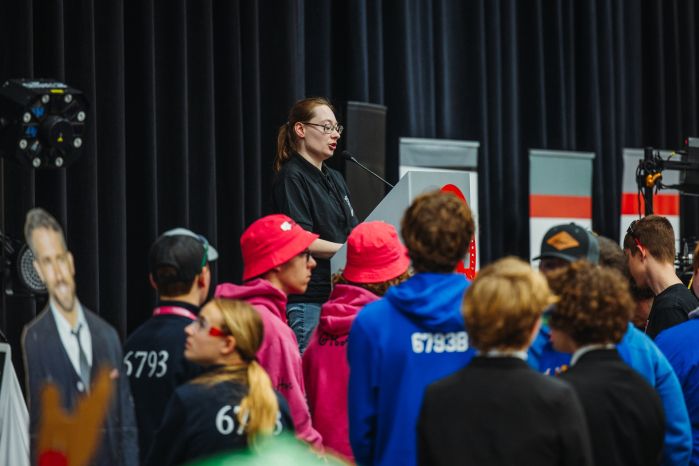
Katie Frank Shares Spark that Sustains VEX
More Like Robotics & Industrial Controls
